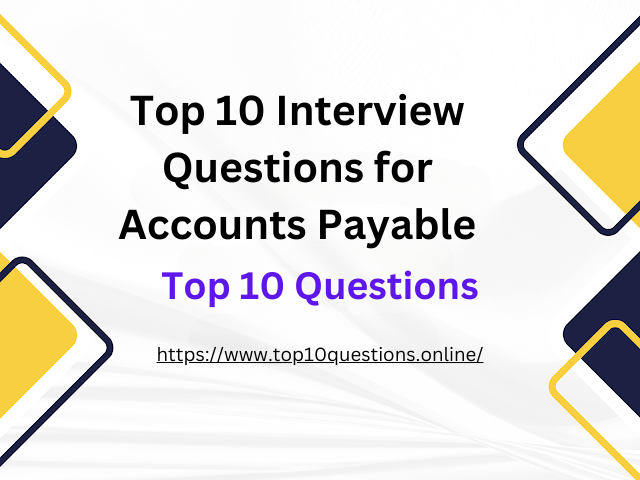Top 10 Interview Questions for Accounts Payable
Master the top 10 accounts payable interview questions to land your dream job. Gain valuable insights and stand out from the competition.
 |
| Top 10 Interview Questions for Aqccounts Payable |
Top 10 Interview Questions for Accounts Payable and How to Answer Them
Introduction
The accounts payable department is critical to any organization's financial health. As such, employers are always on the lookout for candidates with a solid understanding of accounting principles, attention to detail, and excellent communication skills. To help you prepare and excel in your next interview, we've curated the top 10 interview questions for accounts payable roles and suggested ways to answer them effectively.
1. Can you explain what the accounts payable process entails?
Answer: The accounts payable process involves receiving invoices from vendors, validating the details, approving the invoices for payment, and then processing the payment. It also includes reconciling invoices with purchase orders and delivery notes, resolving discrepancies, and maintaining accurate and complete records for auditing purposes.
2. What strategies do you use to prevent errors in data entry and invoice processing?
Answer: I believe in a thorough review and double-check procedure. After entering data, I cross-check each entry against the original invoice. I also use software tools that have built-in error detection capabilities. Additionally, I follow a systematic approach to filing and organizing documents to ensure easy retrieval and cross-referencing.
3. Can you describe a time when you dealt with a vendor dispute?
Answer: In a previous role, I handled a dispute where a vendor claimed we hadn't paid an invoice, but our records showed we had. I calmly gathered the necessary documents, including the payment record and bank statements. I then communicated with the vendor, presenting the evidence in a clear and concise manner, which resolved the dispute amicably.
4. How familiar are you with accounting software and systems?
Answer: I'm proficient in using a range of accounting software, including QuickBooks, SAP, and Zoho Books. I understand how these systems can streamline the accounts payable process, generate accurate reports, and reduce manual errors.
5. How do you handle invoice discrepancies?
Answer: In case of invoice discrepancies, I first review the details of the invoice, the purchase order, and the goods received note. If a clerical error has occurred, I contact the vendor to issue a corrected invoice. If it's an internal error, I coordinate with the relevant department to resolve the discrepancy.
6. What is accrual accounting and how does it impact accounts payable?
Answer: Accrual accounting records revenues and expenses when they are incurred, regardless of when cash is exchanged. This approach impacts accounts payable as expenses are recorded as soon as we receive the goods or services, not when we pay for them. Therefore, it's vital to track all transactions accurately to ensure financial statements reflect the company's financial position correctly.
7. How do you prioritize payments to vendors?
Answer: I typically prioritize payments based on due dates, the terms of the contract, and the relationship with the vendor. Early payment discounts can also factor into the decision. It's crucial to manage payments efficiently to maintain good vendor relationships and ensure smooth supply chain operations.
8. What are the key metrics you track in an accounts payable role?
Answer: Key metrics I track include days payable outstanding (DPO), cost per invoice, percentage of invoices paid on time, and the percentage of discrepancies in invoices. These metrics provide insights into the efficiency and accuracy of the accounts payable process.
9. How do you stay updated with changes in financial regulations and standards?
Answer: I regularly read financial publications, attend seminars and training sessions, and participate in webinars and online forums. Staying current with changes in financial regulations is critical to ensure compliance and accurate financial reporting.
10. How do you deal with confidential information?
Answer: Confidentiality is paramount in a financial role. I ensure all documents are stored securely, access to sensitive data is restricted, and I only discuss confidential matters when necessary and with relevant parties. I also adhere to the company's data protection policies and guidelines.
Conclusion
Remember, the goal of any interview is to showcase your skills, experience, and fit for the role. These questions and suggested responses are a guide, but your answers should reflect your experiences and understanding of the accounts payable process. Do your research, practice, and go into your interview with confidence. Good luck!